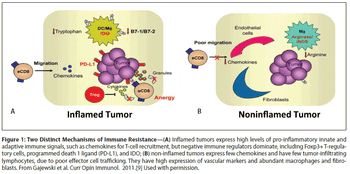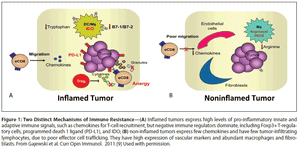
Blood-based markers of note in kidney cancer prognosis include circulating tumor DNA and proteomic markers, according to Michael B. Atkins, MD.

Your AI-Trained Oncology Knowledge Connection!


Blood-based markers of note in kidney cancer prognosis include circulating tumor DNA and proteomic markers, according to Michael B. Atkins, MD.

Clinical trials still have a role in improving outcomes with immunotherapy among those with kidney cancer.

Current research initiatives in the kidney cancer field include exploring anti–PD-1, anti–LAG-3, and anti–CTLA-4 combination regimens.

This video reviews second-line data from the IMmotion150 trial, which initially studied atezolizumab with or without bevacizumab vs sunitinib in untreated metastatic renal cell carcinoma patients.

Characterizing tumors by PD-L1 expression, immune infiltration, chemokine signature, and tumor mutational frequency may be a means of creating an integrated model for determining which patients may benefit from which immune-checkpoint inhibitors, either alone or in combination.

Dr. Atkins offers his perspective on the “race” between the top two anti-PD1 drugs (Merck’s MK-3475 and Bristol-Myers Squibb’s nivolumab), and weighs in on where a new agent, pidilizumab, fits into the picture.

In this exclusive interview, Michael B. Atkins, MD, director of the Georgetown Lombardi Comprehensive Cancer Center, discusses some of the most important melanoma research to come out of this year’s ASCO meeting and talks about the future of melanoma therapies.

CancerNetwork speaks with Dr. Michael Atkins, who has extensive clinical experience in kidney cancer and development of various new treatments and is presenting this weekend during the renal cancer translational science session at the American Society of Clinical Oncology 2012 Genitourinary Cancers Symposium.

Published: June 11th 2012 | Updated:

Published: February 3rd 2012 | Updated:

Published: November 10th 2014 | Updated:

Published: June 26th 2014 | Updated:

Published: June 8th 2017 | Updated: